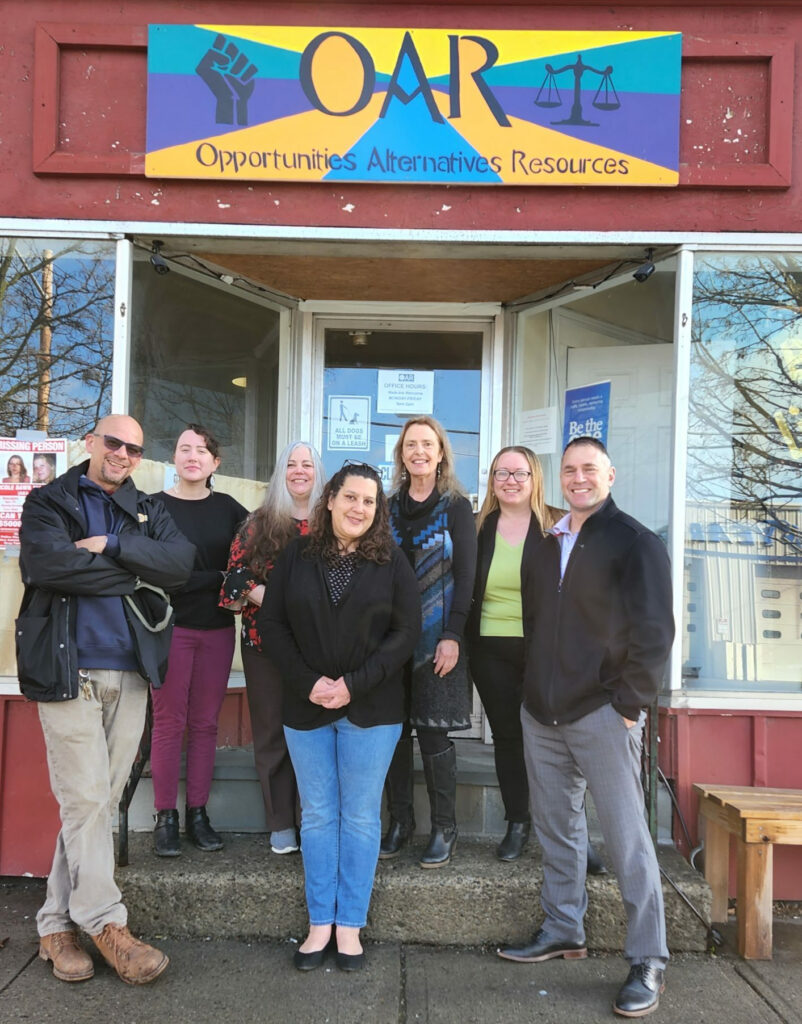For the last decade now, Anita Peebles ’89 has worked with Opportunities, Alternatives, and Resources (OAR) of Tompkins County to support individuals who have crossed paths with the criminal justice system. As Senior Client Service Worker, she builds trust and connection with her clients, welcoming them warmly to the OAR office on Fulton Street. She took a chance when she decided to pursue a second degree at age forty, this time in human services, but said she quickly “found [her] people and figured out this is what [she’s] supposed to do.” Recently, I had the opportunity to speak with her and gain insight into the heartfelt compassion that drives OAR’s work.
Peebles explained that although she has never experienced incarceration or addiction, she’s had many of the same life experiences as the clients she serves: “I was in foster care for years until I was adopted as an older child. I got married very young and made a lot of really poor choices that could have led me to the same path that they’re on. The difference, at least for me, was that I had really strong family support.” Her ability to relate to OAR’s clients has kept her motivated and dedicated to this line of work. “I know how many second, third, fourth chances that I had, and I feel like everybody deserves that.”
OAR was founded in 1976 by a group of volunteers who relayed messages from people in the county jail to their loved ones. It has since expanded its services to include affordable transitional housing through the Sunflower and Endeavor Houses, college preparation and support through the College Initiative Upstate, advocacy, and a charitable bail fund. Regardless of their background, OAR meets its clients where they’re at. “People can walk in and tell us what they need. If we can’t do it, we’ll find somebody who can,” explained Peebles.
OAR gets between five hundred and six hundred walk-ins a month. Some clients come in for coffee, food, and clothes donations, some to use the phone or computer, and others to get assistance with paperwork and technology. The technological support OAR offers is especially meaningful to those who have been incarcerated for years and are unfamiliar with the new technologies involved in paperwork, applications, and the workforce. “One of the things that shocked me the most when I started was the level of illiteracy,” Peebles noted.
Peebles values building close, caring connections with OAR’s clients. Many of them call her “mom,” and it is a role she is touched to take on. “I just want them to know that somebody cares about them in this world that can be ugly and lonely. I want them to know that I care,” she explained. “Some of them live such a rough life, especially the people that live outside. I think in order to hang on and keep going, you have to know that somebody cares about you, truly without wanting anything in return.”
OAR’s work comes with challenges. The housing affordability crisis in Tompkins County makes it nearly impossible to help community members without an income find housing, and working with people suffering from addiction and mental illness can be demanding. “It’s really hard to watch people suffer,” Peebles said. However, she remains determined to show up for her clients, many of whom she’s known for years, day after day. She’s seen the difference it can make.
Peebles’s message to high school students is a no-nonsense call to compassion: “You don’t necessarily have to give the person standing on the street corner money, but don’t spit on them, right?” She emphasized the importance of understanding that the struggles that her clients face could happen to anyone. “When I was in high school, my future was bright and ahead of me and I thought ‘That’ll never happen to me.’ Then two years out of high school, I was a single mom on welfare, out of an abusive relationship.”
In addition to fostering empathy for others, high school students can also support OAR by donating food, clothing, or money. You can learn more about OAR, its services, and how to support it at oartompkins.org.

Anita Peebles (center) and OAR staff in front of the OAR office. Opportunities, Alternatives, and Resources
